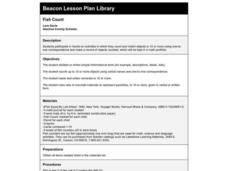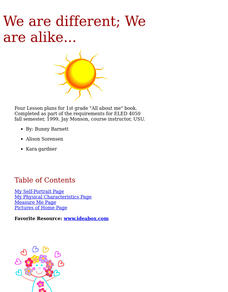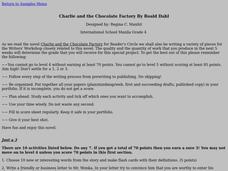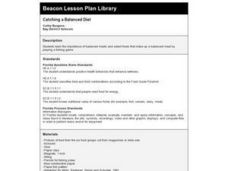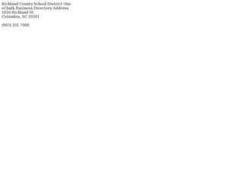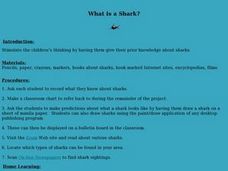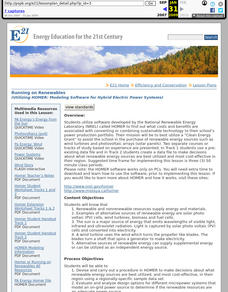Curated OER
The American Mosaic
Eighth graders role play as a poor immigrant family moving from the Old World to the New World in search of the American Dream. They create a portfolio and journal of their travels.
Curated OER
Fish Count
Students participate in hands-on activities in which they count and match objects to 10 or more using one-to-one correspondence and make a record of objects counted, which be kept in a math portfolio.
Curated OER
Romeo and Juliet: Insight into Ourselves
Students research the historical background of Romeo and Juliet as well as Shakespeare's time to better understand the play. Students work in teams to make plans and products targeting their chosen issues to positively impact their...
Curated OER
We Are Different; We Are Alike........
First graders explain that everybody is unique in their own way by participating in this lively, art and language based series of lesson plans. They would greatly benefit from engaging in these plans in the beginning of the year as an...
Curated OER
Does Your Fitness Compute?
Fourth graders chart and analyze baseline data pertaining to improving and maintaining fitness levels. Personal trainers calculate their clients' charts and write a one-page report on the findings for the evaluation portfolio of each...
Curated OER
The Other Roman Empire
Students interpret their findings from resources and explain each Eastern Roman Emperor's policies. They compare Eastern and Western Roman Empires and explain how the transfer of power from the Western Roman Empire to the Eastern Roman...
Curated OER
Family History
Students discover their family history. In this genealogy lesson, students participate in a discussion about family history and why it is important. Students create a family tree and present the family tree to the class. Students write a...
Curated OER
Le Grand Voyage
Eighth graders work in collaborative groups to research a country of their choosing. Groups use the internet to their country and plan a trip to that location. Students complete a multi-media presentation of their country, following a...
Curated OER
Charlie and the Chocolate Factory
Fourth graders read the novel Charlie and the Chocolate Factory for Reader's Circle, they also are writing a variety of pieces for the Writer's Workshop that is closely related to the novel. The quality and the quantity of work that...
Curated OER
Virtual Travel Plan
Students navigate the web to prepare for an imaginary trip and record expenses involved. In this state culture and symbol lesson, students gather information to be used in a multimedia project.
Curated OER
May Writing Ideas
In this writing worksheet, students explore and discover a variety of ways to help make writing more interesting and creative.
Curated OER
Problem Solving
Fifth graders read and write equations. In this equation writing lesson, 5th graders use real life scenarios to write equations. Students use manipulatives, draw pictures and make tables to understand how to write equations. Students...
Beacon Learning Center
Catching a Balanced Diet
First graders explore the importance of balanced meals. They play a fishing game to help them select foods to make up a balanced meal.
Curated OER
Civilizations of the Ancient Near East
Sixth graders investigate ancient civilizations by creating a research project. In this world history lesson, 6th graders investigate historic civilizations developed close to important rivers of the near East. Students create a...
Curated OER
Modern African Art and Artisans
Students are explained the difference between artists and artisans. They discuss some of the common themes among artisans, such as traditions, materials, process, and inspiration. Students descsribe other modern-day African artisans and...
Curated OER
What is a Shark?
Students discuss their knowledge of sharks. In this shark lesson, students read about various sharks and look up shark sightings in an online newspaper. They create Shark-shaped poetry.
Curated OER
Destination America:
History comes alive for students as they develop an immigrant persona and "become" immigrants who make the journey from Europe to the United States. Once on American soil, they experience the immigration process as they participate in a...
PBS
Unemployment in Elkhart
Fifth to eighth graders explore reasons for and solutions to unemployment. They begin by making a list of luxury goods and discuss why sales of luxury goods would slump in times of unemployment. They then explore infrastructure and why...
Curated OER
William Shakespeare's 'A Midsummer Night's Dream': Conflict Resolution and Happy Endings
Students analyze the characters and conflicts in Shakespeare's 'A Midsummer Night's Dream. For this conflict resolution lesson, students read the play and track the character actions with the specific plots. Students then predict endings...
Curated OER
Political Cartoons of Political Machines: New Your City
Students discover details about political machine bosses. In this political cartoon lesson, students use the provided political cartoon analysis worksheet to analyze cartoons of Boss Tweed. Students then compose essays about the...
Curated OER
ADULT ESOL LESSON PLAN--Level 4--Interpersonal Communication
Students examine and practice different types of interpersonal communication. They encounter how to greet people and say good-by in interpreting formal and informal settings (with proper vocabulary).
Curated OER
Running on Renewables
Students investigate the costs and benefits of switching their school to sustainable technology energy production. They use software called HOMER developed by the National Renewable Energy Lab to do the cost/ benefit analysis. They then...
Curated OER
Understanding Characters
Students analyzing characters from a story by creating an article about one. In this story analysis lesson, students read Charlie and the Chocolate Factory by Roald Dahl, and pick one character to write descriptively about. Students...
Curated OER
Cartoons in the Classroom: Comforting the Afflicted
In this current events worksheet, learners analyze political cartoons about defending those who cannot defend themselves. Students respond to 4 talking point questions.



